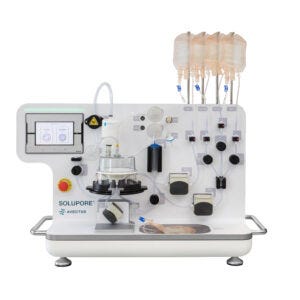
The collaboration between Inceptor Bio and Avectas will aim to improve the development and production of CAR-T cell therapies for the treatment of solid tumors.
Financial details and length of the partnership remain under wraps. However, under the terms of the agreement, Inceptor will use Avectas’ Solupore technology as a substitute to electroporation for engineering T cells with the aim to produce an improved T cell product.
In April 2021, Avectas received $8.7 million in funding to develop the cell engineering platform, Solupore. And the firm says it has been designed to tackle the limitations currently associated with delivering modalities to enable cell engineering.

Avectas’ Solupore technology. Image c/o Avectas
“Cells are introduced into a closed, single-use plastic consumable device, in culture media. The media is briefly and substantially removed through a highly engineered filter within the device. The cells are momentarily sprayed with an atomized solution of cargo and a membrane permeabilization reagent,” a spokesperson for Avectas told us.
“Solupore works by transiently permeabilizing the cell membrane while concentrating the cargo at the cell surface. The mechanism of transport across the membrane is passive diffusion. The cells are resuspended immediately in media and are efficiently transfected while exhibiting excellent cell health and function post process.”
According to both parties, by combining Avectas’ Solupore technology with Inceptor’s chimeric antigen receptor (CAR)-T cell therapy platform, the performance and efficacy of the engineered cells have the potential to be improved.
Inceptor will carry out the activities at its facility in Raleigh, North Carolina and both firms anticipate that they will require to “scale up staff as the collaboration evolves and matures.”
About the Author
You May Also Like





